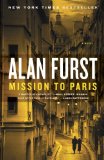Summary | Excerpt | Reviews | Beyond the Book | Readalikes | Genres & Themes | Author Bio

Critics' Opinion:
Readers' Opinion:
First Published:
Jun 2012, 272 pages
Paperback:
Jun 2013, 272 pages
 Book Reviewed by:
Book Reviewed by:
Karen Rigby
Buy This Book
"Oh who cares - they're always squabbling over something. You
can't go to Spain, 'cause there's a war there, you know. Otherwise I
expect the castles are all open, and the restaurants."
He could hear approaching footsteps on the iron deck, then a
ship's officer flicked a flashlight beam over them, touched the brim of
his cap and said, "Bonsoir, Madame, Monsieur."
"What's it called, your movie?"
"Après la Guerre. That would be After the War, in English. It
takes place in 1918, at the end of the war."
"Will it play in Bryn Mawr?"
"Maybe it will. I hope so."
"Well, we can always go to Philadelphia to see it, if we have to."
It was true that he'd "wandered about the world." The phrase suggested
romance and adventure - something like that had appeared in
a Warner Bros. publicity bio - but it didn't tell the whole story. In
fact, he'd run away to sea at the age of sixteen. He was also not really
"Fredric Stahl," had been born Franz Stalka, forty years earlier in
Vienna, to a Slovenian father and an Austrian mother of solidly bourgeois
families resident in Austria- Hungary for generations. His father
was beyond strict; the rigid, fearsome lord of the family, a tyrant with
a face like an angry prune. Thus Stahl grew up in a world of rules and
punishments - there was hardly a moment in his early life when he
wasn't in trouble for doing something wrong. He had two older brothers,
obedient little gentlemen and utterly servile - "Yes, papa," "As
you wish, papa" - who studied for hours and did well in private academies.
He had also a younger sister, Klara, and if he was the bad boy
of the family, she was the angel and Stahl adored her. A beautiful little
angel, with her mother's good looks. Inherited, as well, by the boy
who would become an actor and take a new name.
It was said of him by those who made a living in the business of
faces and bodies that he was "a very masculine actor." Stahl wasn't
sure precisely what they meant, but he knew they were rich and not
for nothing. It referred, he suspected, to a certain inner confidence,
expressed by, among other things, a low- pitched voice - assurance,
not just a bass register - from an actor who always sounded "quiet"
no matter how loudly he spoke. He could play the sympathetic lawyer,
the kind aristocrat, the saintly husband, the comforting doctor,
or the good lover - the knight not the gigolo.
His hair was dark, combed back from a high, noble forehead
which rose from deep- set eyes. Cold gray eyes - the gray was cold, the
eyes were warm: receptive and expressive. Just enough gray in those
eyes for black- and- white film, and even better - it turned out to his
great relief - in technicolor. His posture was relaxed - hands in pockets
for Stahl was not a weak gesture - and his physique appropriate for
the parts he played. He'd been scrawny as a boy but two years as an
Ordinary Seaman, scraping rust, painting decks, had put just enough
muscle on him so he could be fi lmed wearing a bathing suit. He couldn't
punch another man, he wasn't Clark Gable, and he couldn't fi ght a
duel, he was not Errol Flynn. But neither was he Charles Boyer - he
wasn't so sophisticated. Mostly he played a warm man in a cold world.
And, if all his movies were taken together, Fredric Stahl was not somebody
you knew, but somebody you would very much like to know.
In fact he was good at his profession - had two Oscar nominations,
one for Supporting Actor, the other for the lead in Summer
Storm - and very much in control of gesture and tone but, beyond
skill, he had the single, inexplicable quality of the star actor or actress.
When he was on screen, you couldn't take your eyes off him.
Stahl shifted slightly in the deck chair, the damp was beginning to
reach him and he had to suppress a shiver. And, he sensed, the weather
was turning - sometimes the ship's bow hit the oncoming wave with
a loud smack. "We might just have a storm," he said. It was, he
thought, time to get Iris back where she belonged, the cuddling had
devloped a certain familiar edge.
Excerpted from Mission to Paris by Alan Furst. Copyright © 2012 by Alan Furst. Excerpted by permission of Random House. All rights reserved. No part of this excerpt may be reproduced or reprinted without permission in writing from the publisher.





The Flower Sisters
by Michelle Collins Anderson
From the new Fannie Flagg of the Ozarks, a richly-woven story of family, forgiveness, and reinvention.

The House on Biscayne Bay
by Chanel Cleeton
As death stalks a gothic mansion in Miami, the lives of two women intertwine as the past and present collide.

The Funeral Cryer by Wenyan Lu
Debut novelist Wenyan Lu brings us this witty yet profound story about one woman's midlife reawakening in contemporary rural China.
Your guide toexceptional books
BookBrowse seeks out and recommends the best in contemporary fiction and nonfiction—books that not only engage and entertain but also deepen our understanding of ourselves and the world around us.